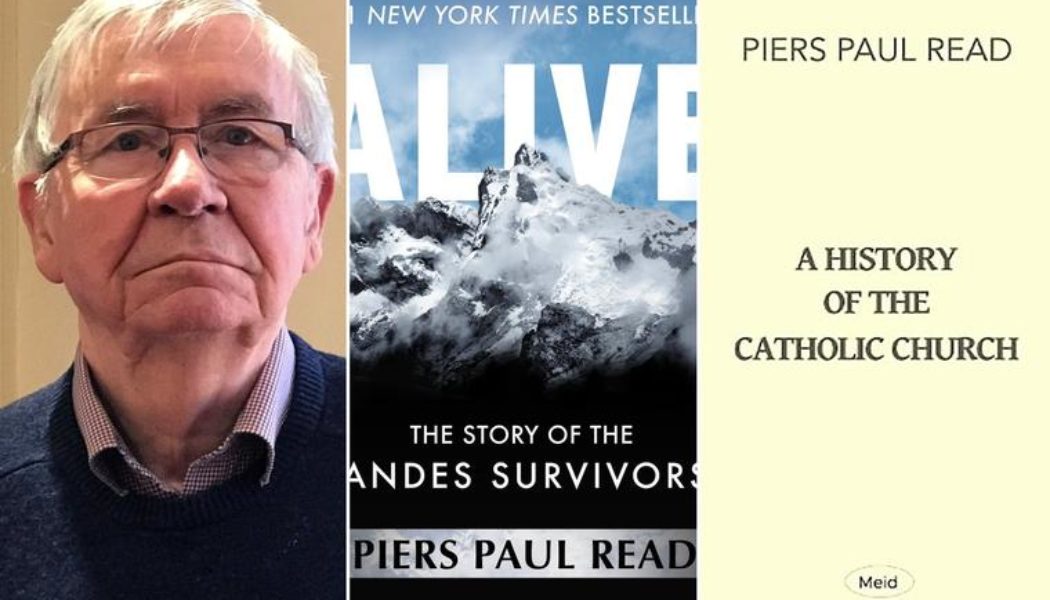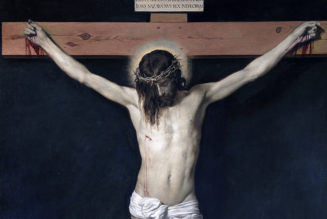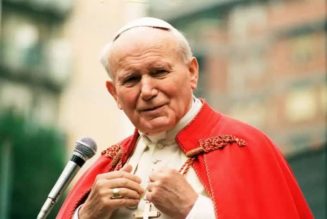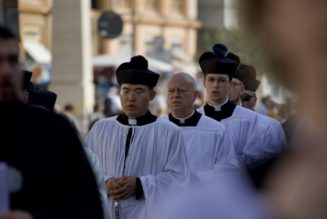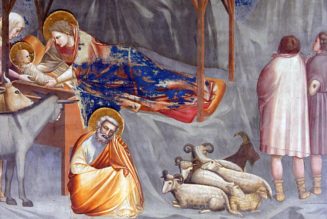
LONDON — “I thought I would like her to know about the Church not just because I’m a Catholic but also because it is part of our culture,” says Piers Paul Pead, speaking to the Register.
The “her” he is referring to is his non-Catholic granddaughter, currently a student at Oxford University. She is, he says, “clever” but freely admits that she knows nothing about the Catholic faith. She was the catalyst — and first, intended audience — for Read’s latest book, A History of the Catholic Church (Meid Books), begun during the 2020 lockdowns and published in September 2023.
Described by one reviewer as “a tour de force,” Read’s History has 127 short chapters, from the Church’s roots in Jewish history to the pontificate of Pope Benedict XVI. The narrative describes how a small community of believers was to grow into one of the world’s most noteworthy institutions, with chapters on the challenges faced by the Church in her 2,000-year history from the emergence of Islam and the schism with the Orthodox, through to the Protestant Reformation and the French Revolution, with more recent threats from Bolshevism and Nazism, as well the rise of today’s secularism. Not so much a Church history, Read wanted to write of a Church through the lens of the secular history around her. There are also chapters on Catholic art, architecture, philosophy and literature as the author seeks to present not so much an academic treatise as a selection of episodes. Conscious of his granddaughter’s needs, his history is written for what he describes as “a general audience” as much as for Catholics.
Read is keen to stress that his work is not “a defense of the Church” per se nor a work of apologetics. Yet he notes, “One reviewer sensed that I loved the Church — and I do.” Furthermore, he points out that, “Even in sociological terms, the Church has been a great benefit to the world.” While not shying away from recent abuse scandals, he is clear about their source, stating they have been “a terrible blow of the devil.” Furthermore, he maintains that the media have used the statistically relatively few clerical offenders “to bludgeon the [whole] Church,” leaving him “feeling sorry for 96% of priests who are good, holy men.”
Piers Paul Read was born March 7, 1941, in Beaconsfield, England, the third son of the distinguished poet and art critic Sir Herbert Read and Margaret Ludwig, a musician. Read’s mother was a Catholic convert and he was sent to the Benedictine school at Ampleforth, Yorkshire. It was while a pupil there, that, he received the gift of faith. He remembers one occasion, while adoring the Blessed Sacrament at Benediction, that “looking at the Consecrated Host in the monstrance, I believed it was God.” Seventy years later, that boyhood experience still resonates with him. Now an octogenarian, his faith in the Blessed Sacrament remains as strong as ever: “That God became man is extraordinary but that he left us the Eucharist is awesome.”
A major influence in his faith journey was the witness of the Benedictine monks who taught him at Ampleforth. He describes their religious life as “seeping” into all aspects of the school and into the lives of those who attended it. Subsequently, Read’s faith never faltered: remaining a practicing Catholic throughout his life. That said, he admits at times to being “baffled by what’s going on” in the current Church. Doubtless informed by the historian’s long view of history, he is “suspicious of the word ‘reform’” as used in some contemporary debates.
Read left Ampleforth at the age of 16 and went to live in Paris where he attended the Cours de Civilisation Française at the Sorbonne. Then, between 1959 and 1962 he studied history at St. John’s College, Cambridge, England. After graduating, he worked for the Kindler Verlag in Munich, was a stipendiary of the Ford Foundation in Berlin, and worked on the staff of The Times Literary Supplement in London before spending a year on a Harkness Fellowship in the United States.
The year 1966 saw the publication of Read’s first novel, Game in Heaven with Tussy Marx. “Fiction is my first love,” he readily admits, enjoying the creative process whereby “characters take on a life of their own.” When asked if all fiction is ultimately autobiography, he agrees to some extent but points out that his characters are more “suggested by real people rather than modeled upon them.” Drawing the analogy with theater, he observes that actors “live through their roles,” while writers “live through their characters.” As to the notion of a “Catholic novel,” he is skeptical. “I don’t think there is such a thing,” he counters, preferring a different formulation: “I never set out to write a ‘Catholic novel.’ … If you are a novelist and a Catholic, your writing is Catholic.” His novels, he suggests, do show “the workings of grace” in ways that he trusts a non-Catholic may recognize. “In that sense,” he adds, “there is such a thing as a Catholic novel.”
As well as his fiction — 17 novels published to date — Read has written scripts for film and television. However, what brought him to the public attention still more was his 1974 international bestseller, Alive: The Story of the Andes Survivors. Read was chosen by the Uruguayan survivors of a 1972 air crash in the Andes to write an account of their ordeal. The book went on to become a publishing sensation. The New York Times described it as “thunderous entertainment” and as a work that “should be read by sociologists, educators, the Joint Chief[s] of Staff. By anyone, in fact, whose business it is to prepare men for adversity.” Over the next 50 years, the book would go on to sell 5 million copies worldwide, be awarded the Thomas More Medal for the most distinguished contribution to Catholic literature of 1974, and be turned into the eponymous 1993 motion picture.
Read’s seven other non-fiction titles have ranged from accounts of infamous criminals The Train Robbers (1978), to equally infamous failures in modern technology: Ablaze: The Story of Chernobyl (1993). He has also written books on several controversial historical topics: The Templars (1999) and The Dreyfus Affair (2012). At the request of the actor Alec Guinness’ widow Merula, Read wrote Alec Guinness: The Authorised Biography (2003), which one reviewer in The Spectator described as a “splendid biography … an astonishingly moving portrait of a very complex man, his loving marriage, and his quest for spiritual solace.” However, as well as praise the book attracted criticism from some quarters on account of what it revealed about the actor’s private life. Yet, the fact was that Guinness and Read had been friends, a friendship that the latter says was centered on their shared Catholic faith. It was this faith, he goes on to suggest, that prompted the Guinness family to entrust him with the writing of what would be an authorized biography.
Currently, Read is a Fellow of the Royal Society of Literature. He has served on the governing bodies of the Society of Authors, the Institute of Contemporary Arts, the Catholic National Library and Aid to the Church in Need. Between 1975 and 1977 he was a member of the Literature Panel of the Arts Council; in 1980 was Adjunct Professor of Writing at Columbia University, New York.
In 1967, Read married Emily Boothby. Together they have four children and six grandchildren. During their married life, the couple have lived in the United States, France and North Yorkshire, before eventually settling in London in 1980, where they remain to this day.
As one of Catholicism’s foremost men of letters in the Anglophone world, what advice, if any, would he give to aspiring writers — does he think, for example, that creative writing courses nurture talent? He is not sure of the benefit of such courses, simply stating that writing, at least writing well, is “very difficult to teach.” Having been a judge on a number of literary prizes, he believes, however, that real talent is easily identified when it does exist. Perhaps not surprisingly, therefore, his advice to prospective authors is workmanlike: while nonfiction may be “easier” than fiction to write, it is beholden on the author working in whatever genre to do careful research and gather whatever material is needed before embarking on any project.
As with most successful authors, his writing advice seems to be as much about perspiration as it is inspiration. Yet, looking back over his career working in different genres, he feels his attempts “to show the workings of grace” do reflect a deeper calling running through his life and craft, which Piers Paul Read sums up simply and profoundly: “I felt I had a vocation. It was what God wanted me to do.”
